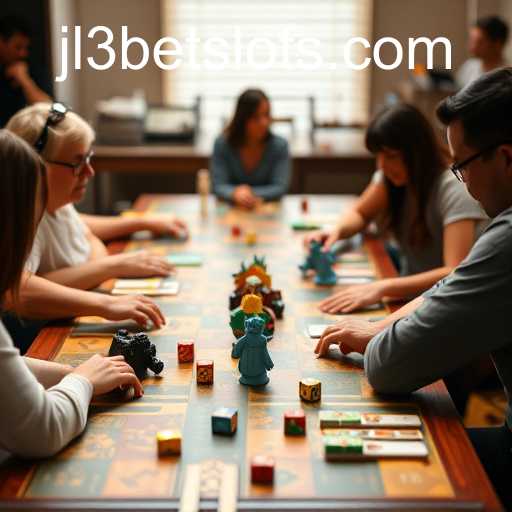An in-depth look at the resurgence of tabletop games, the innovation of JL3Bet, and the industry's growth potential.
The Rise of Tabletop Games in the Modern Era
In an era dominated by digital entertainment, the resurgence of tabletop games has been nothing short of remarkable. These games, which encompass a broad category that includes board games, card games, and role-playing games, have seen a significant increase in popularity. This rise can be attributed to a variety of factors, including the growing desire for tactile experiences, increased socialization opportunities, and an ever-expanding array of innovative games.
The Return to Tactile Experiences
One of the most compelling reasons for the resurgence of tabletop games is the growing desire for tactile experiences in an increasingly digital world. As more of our interactions become mediated through screens, individuals crave the direct engagement that tabletop games provide. There's something uniquely satisfying about rolling dice, shuffling cards, or moving pieces across a board. This tactile nature not only adds to the enjoyment of gameplay but also enhances the overall experience.
Creating Social Opportunities
As social beings, humans naturally seek opportunities to interact with others. Tabletop games facilitate these interactions in a way that few other activities can. While digital games often focus on individual achievement or virtual interactions, tabletop games emphasize face-to-face communication and direct cooperation or competition. Gatherings organized around board games or role-playing sessions allow participants to bond, strategize, and compete collaboratively. This aspect of tabletop games makes them ideal for social gatherings and communities looking to strengthen interpersonal connections.
The Role of Innovation in Tabletop Games
The tabletop game industry has witnessed a renaissance fueled by innovation and creativity. New games are constantly being introduced, incorporating fresh mechanics, themes, and narratives. Game designers are pushing boundaries, crafting immersive experiences that appeal to a wide audience. This diversity ensures that there is a tabletop game for everyone, whether they're looking for a quick card game or an epic role-playing campaign.
JL3Bet: A Game-Changing Innovation
Among the most exciting recent developments is the introduction of JL3Bet, a hybrid tabletop game that blends elements of traditional gameplay with digital enhancements. JL3Bet utilizes an app-based system to augment the physical game, introducing dynamic elements that change the course of play based on real-time data. This fusion of analog and digital gaming offers players a unique experience and represents a potential future direction for tabletop games.
Community Building and Inclusivity
Tabletop games have also played a crucial role in fostering community and inclusivity. These games often bring together diverse groups of people, united by a shared interest. Many gaming communities are consciously inclusive, welcoming people from different backgrounds and cultures. This open-mindedness enriches the playing experience and expands the horizons of all participants.
The Economic Impact of Tabletop Games
The economic impact of the tabletop gaming industry is significant. Over the past decade, sales of board games and related products have risen sharply. This growth has stimulated a variety of ancillary sectors, including game cafes, convention hosting, and retail businesses dedicated to board games. Smaller, independent publishers have also flourished alongside larger companies, leading to a more diverse marketplace.
The Role of Crowdfunding
Crowdfunding platforms have become crucial to the success of tabletop games, allowing creators to fund production through direct support from their future customers. These platforms have democratized game development, giving independent designers and publishers a chance to bring their unique visions to life. Popular sites like Kickstarter have become breeding grounds for innovative and experimental games that might never have seen the light of day through traditional publishing routes.
Connecting Generations Through Games
One of the most heartening aspects of the tabletop gaming renaissance is its ability to bridge generational gaps. Grandparents can sit down with grandchildren, teenagers can play with their parents, and friends can gather regardless of age. The simplicity and adaptability of many tabletop games make them ideal for multi-generational play, creating shared memories and strengthening family bonds.
Challenges Facing the Industry
Despite the positive trends, the tabletop gaming industry faces several challenges. Increased demand has led to production bottlenecks, supply chain issues, and a crowded market. Publishers must ensure quality while scaling up production and continue innovating to remain competitive. Additionally, the environmental impact of physical production is a growing concern, with many companies seeking sustainable production methods to ensure their long-term viability.
Future Outlook
The future looks bright for both tabletop games and games like JL3Bet that push traditional boundaries. As designers continue to innovate and explore hybrid gaming possibilities, players can look forward to ever more engaging and immersive experiences. The social and tactile nature of tabletop games ensures they will remain a beloved pastime, offering shared experiences in a digital world increasingly defined by solitary pursuits.




